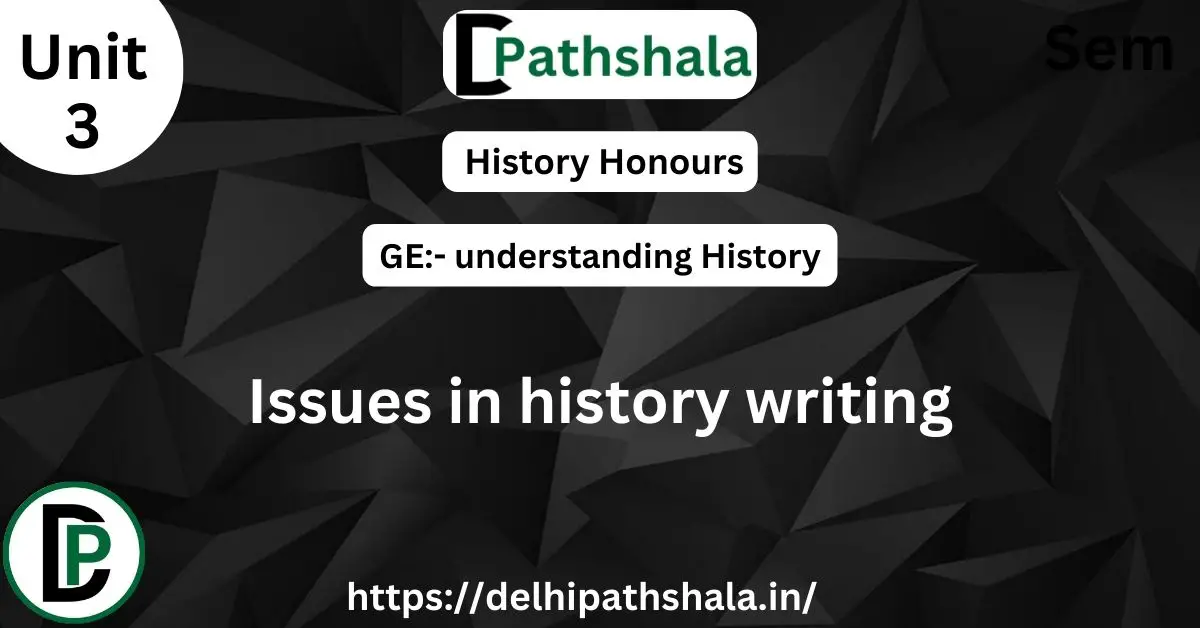In this post, notes of “Unit 3: Issues in History Writing “ from “GE: Understanding History” are given which is helpful for the students doing graduation this year.
Unit 3: Issues in History Writing looks at the problems and debates that come up when historians write about the past. This unit discusses how different factors, like biases, points of view, sources, and the political and social environments, affect how history is written and understood. It also looks at how history writing changes over time and why stories about the past might be different. Here are the main points from this unit:
1. Perspective and Bias in History Writing
- Historical Bias: Historians can have biases based on their beliefs, politics, culture, or time period. These biases can affect how they interpret events and what they focus on.
- Example: Historians in different political situations may describe wars in very different ways, with one side highlighting bravery and the other focusing on negative effects.
- Sources of Bias: Bias can also be present in the sources historians use. Documents from powerful people or institutions might show a slanted view of events.
- Challenging Bias: Historians try to be objective, but it’s important for readers to spot any biases in both the histories and the sources used. Some historians work to include the views of less-represented groups.
2. Politics and Ideology in History Writing
- Political Influences: Governments may influence how history is written, sometimes to promote their own interests or to silence opposing views.
- Example: Authoritarian governments might change history to support their rule.
- Nationalism and History: Nationalistic movements often use history to build pride and identity, sometimes downplaying negative actions.
- History and Propaganda: History can be rewritten to justify political actions, like wars or conquests.
- Politics of Memory: Different groups may have opposing views on the same historical events, often due to political reasons.
3. Historical Revisionism
- What is Historical Revisionism?: This is when accepted histories are re-examined and new interpretations are offered, often based on fresh evidence.
- Positive Revisionism: Sometimes, this leads to more accurate and inclusive histories, highlighting the experiences of overlooked groups.
- Negative Revisionism: However, it can also distort history for political reasons, like downplaying serious events.
- Examples of Revisionism: Different views on events like the American Civil War or the Vietnam War show how history can be reinterpreted.
4. Use of Sources and Evidence
- Selective Use: Historians choose which sources to use, and this can shape the story they tell.
- Missing Voices: Often, the voices of less powerful groups are left out of history, which historians are now trying to include.
- Historical Gaps: Some events might not be well-documented, making it hard for historians to tell a complete story.
- Interpretation of Evidence: Different historians may look at the same source and come to different conclusions.
5. Ethics of History Writing
- Responsibility to Truth: Historians should seek to present the truth, but history can be complex with many interpretations.
- Sensitivity to Trauma: When writing about painful events, historians must be respectful and careful.
- Ethics of Representation: How historians portray people in history matters. They should aim for accuracy and avoid stereotypes.
6. History and Collective Memory
- National Identity: How history is told can shape how a nation sees itself, often focusing on positive aspects.
- Memory Wars: Different groups may fight over how to remember the past, leading to heated debates.
- Public History: Public historians, like those in museums or media, influence how history is shared with the public.
7. Global History Challenges
- Eurocentrism: Traditional history often focuses on Europe, leaving out other regions. Global history aims to correct this by looking at connections among different societies.
- Decolonizing History: There’s a push to recognize the impacts of colonialism and give voice to suppressed histories.
- Comparative History: This approach studies different societies to understand their relationships better.
8. History and Public Debate
- Controversial Histories: Some historical events lead to strong opinions and public discussions, requiring historians to be careful.
- History in Media: Films, books, and news can shape public understanding of history, sometimes oversimplifying it.
- History for Social Change: Histories can be used to highlight past wrongs and advocate for change.
Conclusion
Unit 3, Issues in History Writing, discusses the tough process of writing history. It points out the challenges historians face with bias, source selection, politics, and ethics. This unit stresses the need to analyze historical narratives critically and understand how they shape both current society and future perspectives. Historians work to uncover the past and influence how we remember it.


